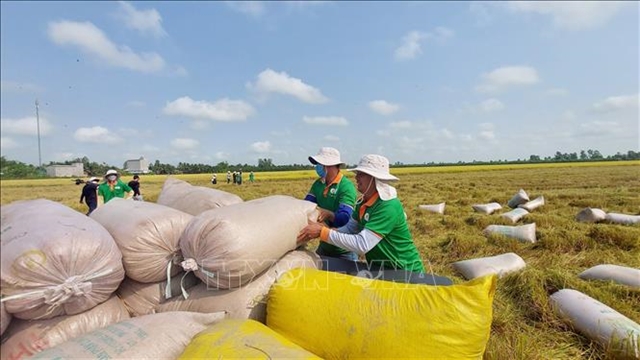 Economy
Economy

.jpg) |
| A panel discussion at the Vietnam Sustainable Development Business Forum (VCSF) 2022in Hà Nội on December 1. — Photo baoquocte.vn |
{ "id": "GrfbnNyUUz", "type": "myToolImages", "data": { "data": "" } }
HÀ NỘI — Phạm Tấn Công, President of the Vietnam Chamber of Commerce and Industry (VCCI), emphasised that innovation, creativity and digital transformation will help businesses accelerate sustainable development.
He was speaking at the Vietnam Sustainable Development Business Forum (VCSF) 2022, themed "Transform, Speed up, Breakthrough: Sustainable Business – Prosperous Nation", held by VCCI in Hà Nội on December 1.
Sustainable business has become an inevitable trend, and corporate sustainable development strategies must be built on the Economic, Environmental, Social and Governance (EESG) factors, Công said.
Those who have adopted responsible business prove to be more resilient against challenges and can readily seize the economy's opportunities.
"The values of sustainable business need to be shaped and built based on a core value system of entrepreneurs and businesses. That is business ethics and business culture," he said.
In the context of global integration and competition, ethical requirements in production and business, consumer protection, environmental protection, green economy, and circular economy are being promoted. They have become new standards for entering markets, especially in developed countries.
Business ethics and culture both create new internal abilities and competitiveness for enterprises and are indispensable foundations for the sustainable development of enterprises.
A survey conducted by VCCI with more than 10,000 businesses nationwide shows that 56 per cent see opportunities from climate change. Of which, about 30 per cent said it is time to restructure and rearrange production, while 17 per cent said it is an opportunity to create new technology products and services and develop more markets.
Nguyễn Quốc Khánh, Executive Director of the Research and Development Division, Vietnam Dairy Products Joint Stock Company (Vinamilk), said: "Vinamilk's farm system is an example of sustainable development. Practising regenerative agriculture at Vinamilk's farms, we use renewable energies such as solar energy and technology systems to reduce methane emissions."
Vũ Thị Kim Chi, Deputy Head of the Investment Promotion and Support Department of Quảng Ninh Province, said Quảng Ninh considers sustainable development an urgent task. Therefore, in its development strategy, Quảng Ninh has changed the economic structure from brown to green.
The private sector plays an important role in mobilising investment to develop the green economy. Quảng Ninh has piloted a public-private partnership model in implementing key transport infrastructure projects such as Vân Đồn airport and highways.
In addition, it has promoted administrative procedure reform and improved the business investment environment to create favourable conditions for businesses in expanding investment.
This is the first step in mobilising private resources to promote green growth and sustainable development, Chi said.
Besides that, to meet development needs, Quảng Ninh has also approached energy sources for sustainable development. Instead of depending on the traditional material source of coal, the province aims to develop new energy sources such as wind power, solar power and gas power in the provincial development plan future.
Chairwoman of the Board of Directors of Deloitte Vietnam Hà Thị Thu Thanh, Vice President of Vietnam Business Council for Sustainable Development (VBCSD), said that the trend of ESG practice is receiving more and more attention from the business community because ESG helps improve competitiveness, from helping businesses seize "green growth" opportunities, reduce costs and risks, as well as enhance corporate image.
According to Thanh, since its establishment in 2010, VBCSD has made persistent efforts to promote sustainable business in Vietnam. In the future, VBCSD will focus on building the ability to carry out ESG practice for the private sector and applying the Corporate Sustainability Index to corporate governance.
Speaking at the forum, Nguyễn Hồng Sơn, Deputy Head of the Central Economic Commission, emphasised that the development of enterprises is also the country's prosperity.
He said it needs to improve the legal framework, national and local governance ability, and the business environment. Central-run and local authorities should also promote public-private partnerships and strengthen international cooperation to create all favourable conditions for sustainable development.
Meanwhile, enterprises need to renew their thinking, enhance competitiveness, and increase corporate value via sustainable business management practices. They should implement the Sustainable Business Index developed by VCCI, he said. VNS




